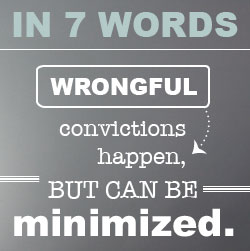24/7 (+5) is an ongoing multimedia series that celebrates the innovative work of UW Law faculty. We asked Professor Keith Findley to explain his latest research in three ways:
- a 24-second video
- a 7-word summary
- 5 questions
5 questions for Keith Findley
What research question are you asking?
What are the systemic causes of error that lead to wrongful criminal convictions of the innocent, and failures to convict the guilty? What reforms can minimize the risks of error and improve the reliability of the criminal justice system?
What are you finding?
While we can attribute some errors that result in wrongful convictions to individual misconduct (bad actors), more fundamentally the errors are systemic — structural flaws that lead to failure to identify the guilty or that even induce false evidence. Frequent instances include eyewitness misidentification, false confessions, flawed forensic science, perjury from incentivized witnesses, uncontrolled cognitive biases, inadequate resources for prosecutors and defense attorneys, and uneven and inadequate access to information (limited “discovery”). I’m looking into systemic reforms that can prevent these errors.

What’s the current status of laws and policies relating to your work?
Reform is always slow, but the revelations produced by the study of wrongful convictions have made change possible in ways hardly imaginable 25 years ago. For example, police are beginning to change the way they conduct eyewitness identification procedures and interrogate suspects. Laws now exist in every state providing the right to DNA testing for the criminally convicted, where the results might prove their innocence. The Department of Justice and the National Institute of Standards and Technology have created a National Forensic Science Commission to oversee and improve forensic sciences. And the list goes on. Much remains to be done, but real change is occurring.
What does your research bring to your classroom?
I teach Introduction to Criminal Procedure, Evidence and Wrongful Convictions at the Law School. The new insights and real-world examples from my research enable critical examination of the criminal justice system in each of these courses—from the way police investigate crimes to the way courts admit and utilize evidence to the review of convictions in the appellate and post-conviction processes. These insights embody the law-in-action approach to teaching law that we prize at UW Law School.
How will this research matter in people’s lives?
The effects are obvious: reforms improve the reliability of the criminal justice system. We’re working to reduce the risks that innocent people will be wrongly convicted, while at the same time increasing the chances that true perpetrators will be apprehended and convicted. That makes our communities safer for all of us.
Learn more:
- "Implementing the Lessons from Wrongful Convictions: An Empirical Analysis of Eyewitness Identification Reform Strategies," Missouri Law Review, forthcoming
- "Reforming the 'Science' in Forensic Science," Wisconsin Lawyer, November 2015
- "The Multiple Dimensions of Tunnel Vision in Criminal Cases," Wisconsin Law Review, 2006
UW Law School's 24/7 (+5) Research Series is adapted from the 24/7 Lecture Series, presented by the Annals of Improbable Research.
Submitted by Tammy Kempfert on January 26, 2016
This article appears in the categories: 24/7 (+5) Research Series